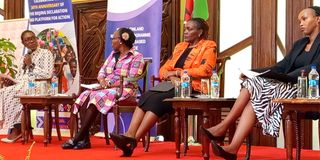Two blows, one crisis: how Trump and treasury threaten Kenya’s gender progress

From left: GBVRC Executive Director Alberta Wambua, Chief of Party for the UKAid Peace and Security program Jaki Mbogo, Vilcom Networks Limited CEO Agnes Limo, and Kewopa Executive Director Mercy Mwangi during the National Gender Sector Working Group meeting at Safari Park Hotel in Nairobi on January 27, 2025.
What you need to know:
- Implementers of interventions are struggling to secure funding to initiate, complete, and sustain their work.
- Stakeholders say zero and inadequate funding as a major challenge in the drive for gender equality.
Kenya's gender equality initiatives are facing a severe funding crisis, threatening to derail critical programs across the country.
At the bi-annual National Gender Sector Working Group meeting in Nairobi last week, stakeholders painted a grim picture of projects stalling due to zero or inadequate funding. The January 27 gathering highlighted how financial constraints are hampering the nation's progress toward gender equality.
"We're struggling to even conduct basic public participation," said Faith Nashipae, chairperson of the male engagement and inclusion committee. She revealed that while her team had developed a concept for the National Strategy for Male Engagement and Inclusion, they lack resources to move forward with community consultations – a crucial next step in the process.
Nashipae explained that despite developing the concept for the National Strategy for Male Engagement and Inclusion last year, her team has hit a financial wall. The strategy, currently under review, cannot progress to its crucial public participation phase due to funding constraints.
"We simply don't have the resources to move forward," she said, highlighting how the financial squeeze is preventing meaningful community engagement.
The funding crisis extends beyond male engagement initiatives. Jaki Mbogo, who chairs the women in peacebuilding and conflict resolution sector, described a similar struggle in sustaining women's leadership programs.
"We're facing fundamental challenges in financing women's participation in peace and security efforts," Mbogo said. "From supporting women stepping into leadership roles to ensuring they can maintain those positions – every step requires substantial financial backing."
In response to shifting global donor patterns, stakeholders are now advocating for increased domestic funding. UN Women's country representative to Kenya, Antonia N'Gabala-Sodonon, emphasized this urgent need for local solutions.
"We can't achieve equitable service delivery without addressing these financing gaps," N'Gabala-Sodonon said, pushing for greater domestic resource allocation.
The funding crisis is underscored by stark figures from last year's National Gender and Equality Commission report. Their assessment of gender equality in Kenya's public sector revealed a troubling pattern: public institutions allocated just Sh1.9 billion to gender initiatives in 2022-23 – a mere 0.08 per cent of the total public sector budget.
This falls dramatically short of the Commission's recommended target of 1.5 per cent for gender mainstreaming, highlighting a nineteen-fold gap between current spending and necessary investment.
Now, a fresh challenge looms. President Trump's recent order to suspend USAID funding for 85 days has sent shockwaves through Kenya's gender equality sector. The freeze, pending a review of US foreign assistance, threatens to further destabilise already precarious programs across Africa.
The move echoes Trump's controversial 2017 Global Gag Rule, which dealt a significant blow to healthcare organisations worldwide. That policy barred foreign organisations receiving US health funding from any involvement with abortion services – even when using their own resources. Its impact was far-reaching, affecting more than 1,300 organisations globally and establishing a precedent that still reverberates through international development funding.
The ripple effects of the USAID funding freeze are already being felt across Kenya's gender equality landscape. Organizations have begun receiving stop-work notices, throwing the future of vital programmes into uncertainty.
The International Planned Parenthood Federation (IPPF), a key provider of contraceptive and maternal care in Kenya, became one of the first casualties. On January 28, the organization received a USAID directive to halt its operations across Africa.
The financial impact is staggering. IPPF stands to lose more than $60 million in US funding – a devastating blow that threatens to dismantle essential services for women, youth, and marginalized communities across 13 African nations, including Kenya.

